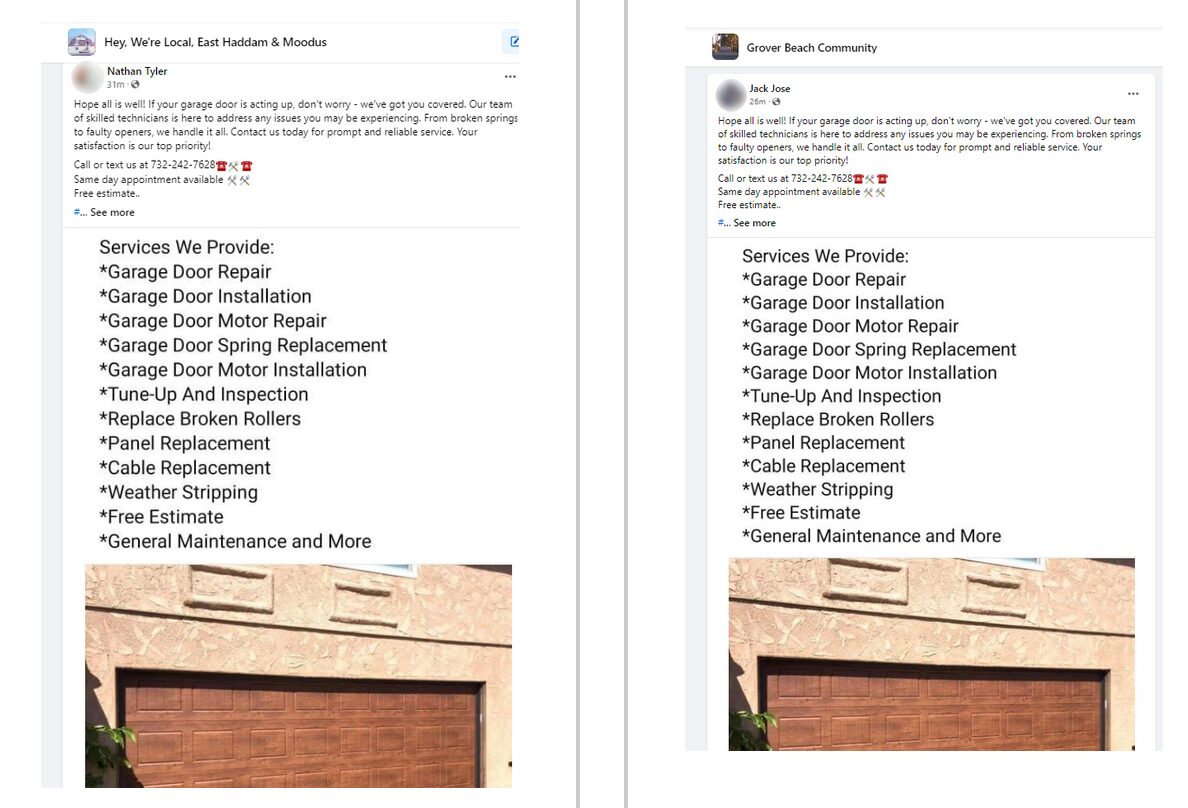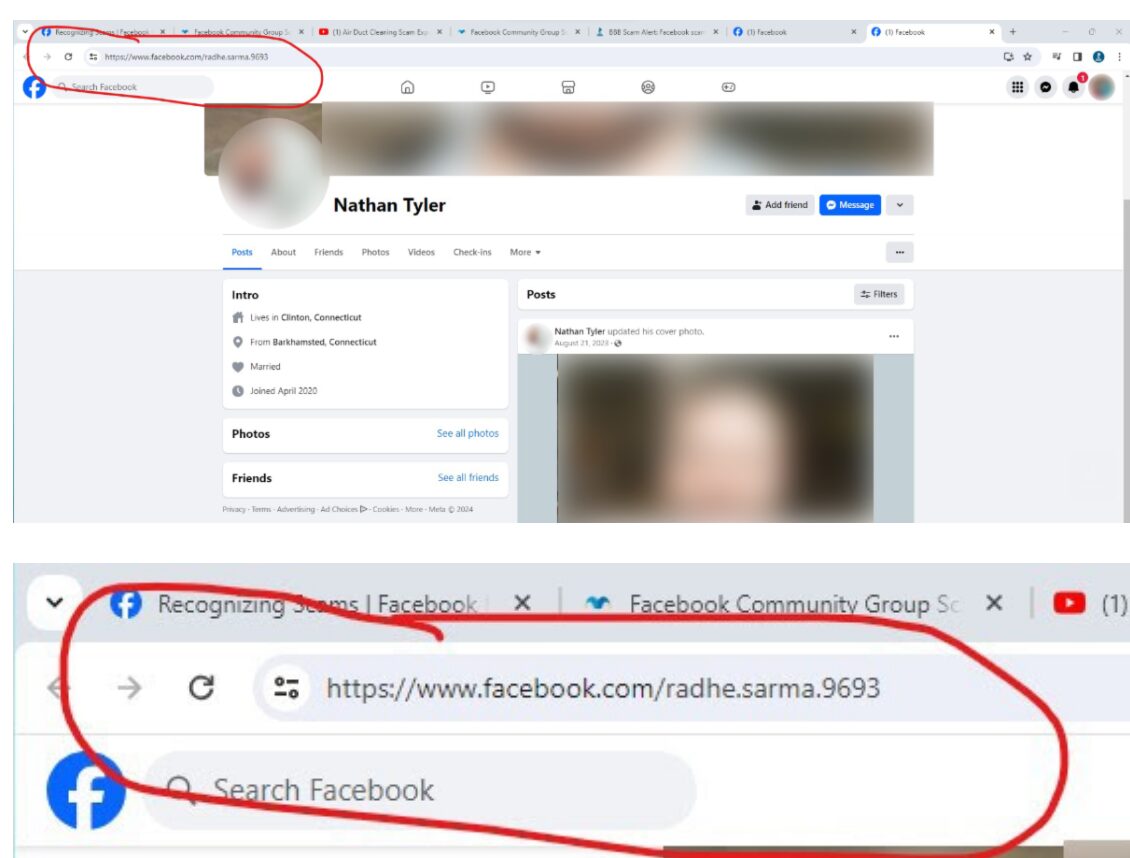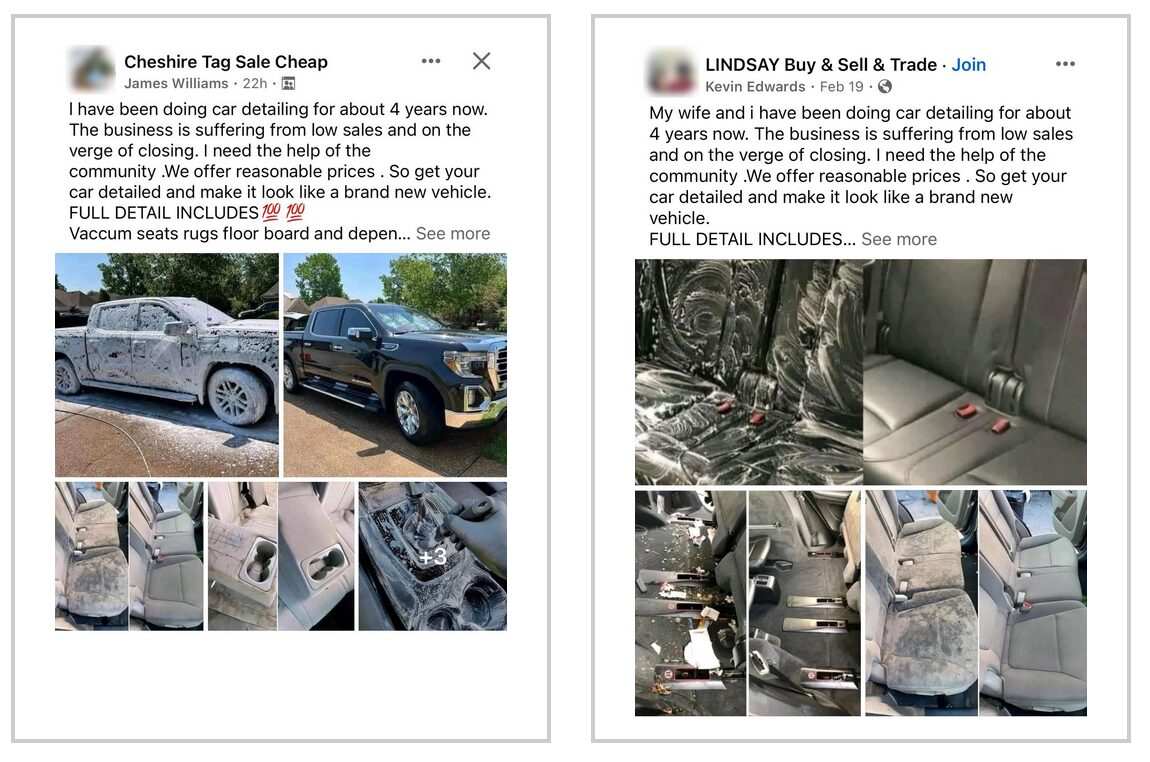Car detailing, duct cleaning, garage door repair… homeowners can find supposed contractors offering up these services in their community Facebook groups on a weekly, sometimes daily basis.
But, are these posts legitimate? In many cases, they aren’t. In fact, according to the CT Better Business Bureau, fraudsters have become so good at hijacking neighborhood Facebook groups, that moderators are having a hard time keeping up. These scammers often use persuasive language and attractive deals to entice unsuspecting homeowners.
Example #1
This ad for garage door repair appeared in the East Haddam Facebook group, “We’re Local.” After we copied the text into an internet search we found the same ad with the same picture, wording, and contact information in a California community Facebook group. How can this “local” business be operating in California and Connecticut? It can’t.

Digging a little deeper, we see that the name of the person posting, “Nathan Tyler,” does not match the name in the URL for the page, which is Radhe Sarma.

Example #2
In a Cheshire community Facebook group, “James Williams” offers up his car detailing services writing, “I have been doing car detailing for about 4 years now. The business is suffering from low sales and on the verge of closing. I need the help of the community. We offer reasonable prices. So get your car detailed and make it look like a brand new vehicle.”
An internet search of that same copy revealed an almost identical post in a Canadian neighborhood Facebook group by a man named Kevin Edwards, “My wife and I have been doing car detailing for about 4 years now. The business is suffering from low sales and on the verge of closing. I need the help of the community. We offer reasonable prices . So get your car detailed and make it look like a brand new vehicle.”

In both examples, the poster’s only activity on Facebook was posts for their services in various Facebook groups. In fact, “James Williams” has been posting car detailing services in Facebook groups across the country, in Florida, Texas, South Carolina, New Jersey, and beyond. While “Kevin Edwards” has been posting throughout Canada. This indicates a coordinated effort to target multiple communities with the same fraudulent scheme.
There are several reasons why scammers find Facebook groups appealing:
1. Access to a Targeted Audience: Facebook groups are often localized, making it easy for scammers to target specific neighborhoods where they can potentially find victims.
2. Perceived Trustworthiness: Community Facebook groups are typically perceived as safe spaces where members can interact and support each other. Scammers exploit this trust to gain credibility.
3. Limited Oversight: Moderators of these groups may not have the resources or time to thoroughly vet every post or advertisement, making it easier for scammers to slip through the cracks.
Just because someone introduces themselves as a resident or neighbor in their post, doesn’t mean they are. In Facebook, search the name of the person making the post plus the name of the service (ie. James Williams car detailing) to see if they are making the same post in multiple states.
Often, air duct cleaning posts lure customers with the promise that no payment will be collected until the work is done. Scammers may use subcontractors who legitimately work in the area but provide subpar service (or pretend to be working) and then send part of the payment to a scammer overseas. This highlights the need for consumers to thoroughly research service providers, ask for references or credentials, and exercise caution before making any payments.
The industries targeted by this scam are those that don’t typically require a license. These scams are not only confusing to consumers, but also hurt real business owners who could use social media as a platform to grow their companies.
Questions to ask:
* Does the poster have much activity on their Facebook page? If you only see posts about these services, it may be a scam.
* How long ago was the profile created? If it’s relatively new, that’s a red flag. Scammers will create new profiles after their old ones get banned.
* Can I find these pictures elsewhere? Do a reverse image search. If you see them posted in other states, that’s a sign of a scam.
* Where is the business located? Scammers may pretend to work for a legitimate company. Look up their website to see if they are located where you live or call the company to find out if the post is legitimate.
More Tips:
* Find similar posts: Copy and paste the text from the post into Facebook’s search tool to see if other posts with the same text and different pictures show up.
* Be skeptical of unrealistic deals: Scammers often use enticing deals to lure victims. Exercise caution and skepticism.
* Educate your community: Spread awareness about common scams and how to identify them within your community Facebook group. Encourage others to be vigilant and share their experiences to help others avoid falling victim.
* If you suspect a post is a scam, report it to Facebook.
* Always research a company by going to BBB.org and looking up the company’s business profile to read complaints and reviews.
* Report scams to Better Business Bureau’s Scam Tracker: bbb.org/scamtracker